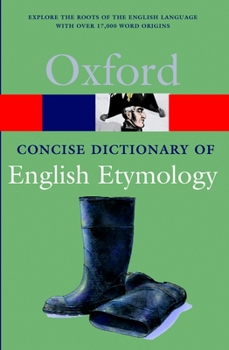The Concise Oxford Dictionary of English Etymology
Select Format
Select Condition 
Book Overview
Where did the words bungalow and assassin derive? What did nice mean in the Middle Ages? How were adder, anger, and umpire originally spelled? The answers can be found in this essential companion to any popular dictionary.
With over 17,000 entries, this is the most authoritative and comprehensive guide to word origins available in paperback. Based on The Oxford Dictionary of English Etymology, the principal authority on the origin and development...
Format:Paperback
Language:English
ISBN:0192830988
ISBN13:9780192830982
Release Date:January 1996
Publisher:Oxford University Press, USA
Length:576 Pages
Weight:0.78 lbs.
Dimensions:1.2" x 5.0" x 7.7"
Related Subjects
Clinical Criticism & Theory Dictionaries & Thesauruses Education & Reference English Etymology Family & General Practice Family Practice Foreign Language Study & Reference History & Criticism Humanities Internal Medicine Language Arts Linguistics Medicine Reference Textbooks Words, Language & GrammarCustomer Reviews
4 ratings
Perfect for the nonscholar
Published by Thriftbooks.com User , 20 years ago
I agree with the earlier reviewers that this isn't the most thorough etymological dictionary available. But let's face it: most of us don't need weightier and more expensive resources than this one. In the ten years that I've owned the ODEE, I've used it hundreds of times, and only occasionally have I found it wanting. As someone who does a good bit of scriptural exegesis, I generally turn to the ODEE before dragging out the Greek lexicon or Latin dictionary. It can usually point me in the direction I need to go. A wonderful resource that should be on the shelf of anyone who loves books and words, especially since our fastfood culture has bred so much forgetfulness of the deep meaning of words.
Great, portable and does the job
Published by Thriftbooks.com User , 23 years ago
I respect the reviews that this is by no means the last word in word origins. However, I have gotten more use out of this book than the other 5 dictionaries behind simply because I can bring it everywhere. Though some may find this a bit odd, I basically bring it on vacation as a second book -- especially in Europe where questions about them seem to crop up. So many more words will get hunted with this book because it will be handy when you need it.
A Little Too Concise to be Useful
Published by Thriftbooks.com User , 24 years ago
Perhaps the main use of etymology references is to learn about words and how they have evolved into current usage. A good etymology reference like the Chambers / Barnhart will track the history of a word right back to its Proto-IndoEuropean roots. This is also what the Onions Oxford Etymology does. Now it is clear the Oxford didn't want to cannibalize sales of its classic Etymology Dictionary which defines about 25,000 words. This concise Etymology is a very large selection from the full Oxford, updated with some materials from the 2nd OED. What is missing in many of the etymologies is the word's full story. So, we have a good book with a decent collection that is not quite complete. IF you're looking for a good etymology at the same price, you'd do better with Ayto's Dictionary of Word Origins - only 8,000 words but provides a much more thorough treatment. If you're willing to splurge, the best etymology is the Barnhart, re-released as the Chambers Dictionary of Etymology. You get over 60,000 words, drawn almost entirely from US sources.
There are better Etymologies Available
Published by Thriftbooks.com User , 24 years ago
First, this Concise Etymology from Oxford updates the mid-1960s Oxford Dictionary of Etymology, edited by Onions ... by adding some new etymologies from the Second OED. However, Oxford clearly did not want to compete with Onion's tome, which is still available in hardcover. So, what to do? This Concise edition, like the full edtion, defines about 17,000 words. The sacrifice you make getting this work is in the actual etymologies themselves. They simply are not thorough or exhaustive. In this Concise Edition, most word origins are not pushed all the way back to their Indo-European or Proto-Indo European roots - something that the similarly priced John Ayto's work does quite well (though with only 8,000 words). If I were to buy only one etymology dictionary, this would not be my first choice. On a budget I would get Ayto's and learn more about fewer words - and for a few dollars more I would recommend the Chamber's/Barnhart - which is far more scholarly and simply more interesting.





